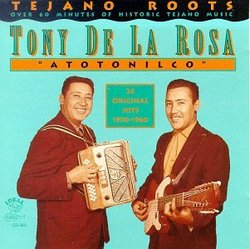| All Artists: Tony De La Rosa Title: Atotonilco Members Wishing: 1 Total Copies: 0 Label: Arhoolie Records Release Date: 12/1/1993 Genres: International Music, Rock, Latin Music Styles: Mexico, Regional Mexican, Tejano Number of Discs: 1 SwapaCD Credits: 1 UPCs: 096297036228, 096297036242 |
Search - Tony De La Rosa :: Atotonilco
 | Tony De La Rosa Atotonilco Genres: International Music, Rock, Latin Music
Old-timey classics come alive in this retrospective collection from Arhoolie Records. Tony De La Rosa's best material from the late '50s and early '60s is included here, including his signature polkas "El Circo," "Atotonil... more » |
Larger Image |
CD Details
Synopsis
Amazon.com
Old-timey classics come alive in this retrospective collection from Arhoolie Records. Tony De La Rosa's best material from the late '50s and early '60s is included here, including his signature polkas "El Circo," "Atotonilco," "El Sube y Baja," and "Ana Rosa." The tune "Atotonilco" is based on an old Mexican standard that De La Rosa learned growing up on the King ranch in South Texas. And "El Circo" is De La Rosa's adaptation of Red Foley's "Alabama Jubilee," which became a top 10 country single in 1951. These tunes from a master of the accordion and conjunto polkas have become the standards that every beginning accordionist has to learn to pass muster. Also notable here is "Sufriendo y Penando," De La Rosa's collaboration with Isidro Lopez, the man who would become the founding father of the modern Tejano sound. --Ramiro Burr

 Track Listings (24) - Disc #1
Track Listings (24) - Disc #1